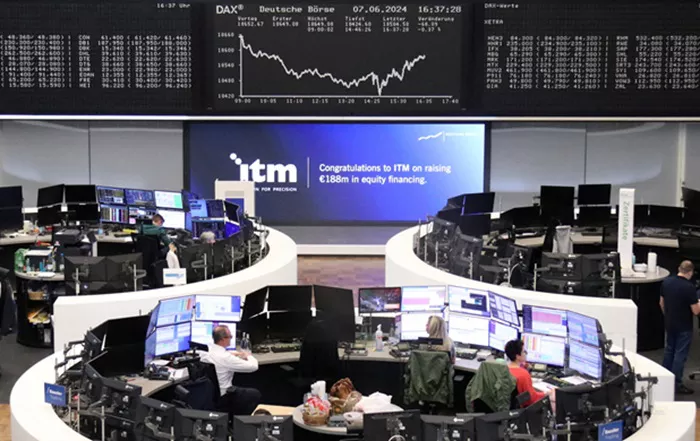European stocks began the week with a subdued performance, primarily influenced by a series of profit warnings from automakers. This downturn came despite a strong rally in Chinese markets fueled by economic stimulus measures from the Chinese government.
Profit Warnings Weigh on European Markets
The pan-European Stoxx 600 index struggled to gain traction, impacted significantly by declines in automotive stocks. Notably, Stellantis NV, the parent company of Jeep, saw its shares plummet by 7.4% after revising its profit margin forecast downward. Similarly, Aston Martin Lagonda Global Holdings Plc experienced a sharp 14% drop, while Volkswagen AG issued its second profit warning in just three months, further dampening investor sentiment.
In the US, equity futures remained stable, reflecting the cautious approach of investors amid these developments.
Contrasting Performance in China
In stark contrast, China’s stock market enjoyed a robust start, with the CSI 300 Index soaring as much as 9.1%, marking its largest single-day increase since 2008. This surge followed the relaxation of homebuyer regulations in three major Chinese cities and a central bank initiative to lower mortgage rates. These measures form part of a broader strategy announced last week aimed at rejuvenating the Chinese economy.
Matthew Haupt, a portfolio manager at Wilson Asset Management, noted, “The government does seem more intent on following through on measures to get the economy firing again, so it does feel slightly more promising than previous attempts.” He expressed cautious optimism that this rally may have more longevity than in prior instances, pending further announcements regarding the economic trajectory.
Mining Stocks Benefit from Chinese Stimulus
The positive sentiment in China also buoyed European mining stocks, with Rio Tinto Group leading the sector’s gains. Meanwhile, the US dollar and Treasury yields remained relatively stable, reflecting a sense of caution among investors regarding upcoming economic data.
Upcoming Economic Indicators
Traders are set to focus on critical economic data releases later in the week, including Eurozone inflation figures and manufacturing activity reports. The highly anticipated US jobs report on Friday will also be crucial for assessing the likelihood of Federal Reserve interest rate cuts as the year comes to a close.
Political Risks in Europe
In addition to economic concerns, political developments in Europe pose further risks. Following the recent national elections in Austria, which saw the far-right Freedom Party achieve a historic victory, traditional political powers are mobilizing to prevent the party from forming a government. This political maneuvering adds another layer of uncertainty to the European landscape.
Market Reactions in Asia
Elsewhere, a downturn in Japanese stocks contributed to a decline in the MSCI Asia Pacific gauge. The recent election of Shigeru Ishiba as the new leader of the ruling party caught many investors off guard, as Ishiba’s administration is expected to maintain continuity in economic and foreign policy. Following this news, the yen saw its previous session’s gains diminish.
Middle East Tensions and Oil Prices
The geopolitical landscape remains fraught with tension, particularly in the Middle East, following Israel’s assassination of Hezbollah leader Hassan Nasrallah in Beirut. In response to these developments, oil prices experienced an uptick, with traders closely monitoring potential reactions from Iran and the implications of China’s stimulus measures on global demand.
Conclusion
As European stocks navigate the complexities of profit warnings from major automakers and contrasting performance in global markets, investors are bracing for a week filled with critical economic indicators and political developments. The outcome of these events will be instrumental in shaping market sentiment and investment strategies in the coming days.
Related Topics:

